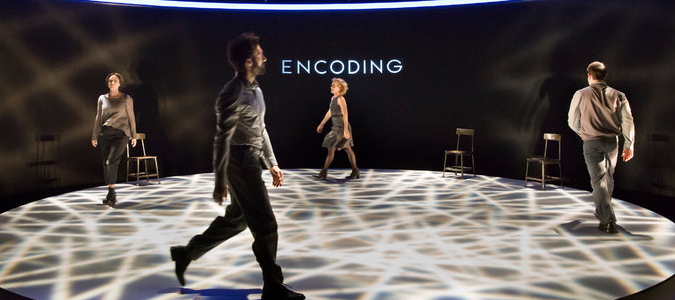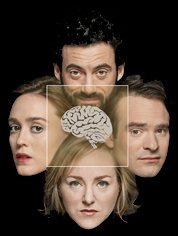

Incognito
Opening Night: May 24, 2016
Closing: June 26, 2016
Theater: MTC - Stage 1
Four actors play a combined 21 characters within Incognito’s three interwoven stories. A pathologist steals the brain of Albert Einstein; a neuropsychologist embarks on her first romance with another woman; a seizure patient forgets everything but how much he loves his girlfriend. Incognito braids these mysterious stories into one breathtaking whole that asks whether memory and identity are nothing but illusions. Nick Payne, the acclaimed writer who brought you the sold-out Broadway sensation Constellations, returns to Manhattan Theatre Club with Incognito, an “astonishing and original” (The Telegraph) American premiere play. Directed by Tony Award winner Doug Hughes (Doubt, Outside Mullingar, The City of Conversation), Incognito takes us into the last uncharted realm—the mind.
BUY TICKETSREAD THE REVIEWS:
May 25, 2016
British playwright Nick Payne excels at a subgenre we’ll call the Science Weepie. He deploys facts to frame or metaphorize the problems of his protagonists, and the collision of data and human pain is often quite affecting. Payne mines drama from deep research into climate change (If There Is I Haven’t Found It Yet) quantum theory (Constellations) and brain science (Elegy, which just opened in London). Actually, Payne’s fascination with gray matter goes back to 2014’s Incognito, a piece about neurology now handsomely produced by Manhattan Theatre Club. On a bare stage, four actors juggle multiple roles in three interwoven storylines. There’s kindly Henry Maison (Charlie Cox), whose operation to cure seizures left him with crippling short-term–memory loss. Morgan Spector plays Thomas Harvey, a pathologist in New Jersey who performed Albert Einstein’s autopsy—then stole his brain, believing that humanity could benefit from studying the organ. Lastly, Martha Murphy (Geneva Carr) is an English neuropsychologist entering a prickly relationship with a lawyer (Heather Lind). The first two narratives are based on true stories; the fictional third artfully links their thematic motifs of neurons, broken families and slippery identity. Doug Hughes directs a solid cast (Cox is especially brilliant as the sweetly tragic Henry) in what is an impressive acting workout—if not completely revelatory drama. For all the engaging tidbits of information, the notion that personality, love or even genius are not hard-wired into the brain so much as accidents of chemistry and sociology probably won’t blow anyone’s mind.—David Cote
READ THE REVIEWMay 24, 2016
Mysteries swirl in storm clouds in Nick Payne’s “Incognito,” which opened on Tuesday night at City Center Stage I, enough to fill many seasons of cliffhanger soap operas. The subjects of these tantalizing puzzles include questions of paternity, a man who murdered his wife on their 30th wedding anniversary, the secrets that lovers keep from each other and the disappearance of an essential anatomical part of a great scientist. Yet the biggest mystery of all, the one that dominates every aspect of this lively, self-examining drama of ideas, is the very apparatus that you’re using to make sense of this sentence. I mean your brain. Granted, it’s somebody else’s brain — the one that belonged to Albert Einstein — that’s at the center of “Incognito,” which embroiders the true story of a Princeton pathologist who spirited away that epochal physicist’s gray matter after performing an autopsy. But really, it’s everybody’s brain that’s being subjected to such probing and exasperated analysis in a work that — directed by Doug Hughes and enacted by a sparkling cast of four — deserves to be called cerebral in every conceivable sense of the word. Restless intellectualism is only to be expected of Mr. Payne, the young British playwright who is fast becoming the theater’s equivalent to Prof. Brian Cox, the heartthrob science nerd of the BBC. In Mr. Payne’s “Constellations,” the glorious two-character play staged on Broadway last year with Jake Gyllenhaal and Ruth Wilson, he applied string theory and quantum mechanics to endlessly fragment and refract the basic boy-meets-girl plot. As for the sources of “Incognito,” well, just take a look at the lengthy list of inspirational books cited in the program for this Manhattan Theater Club production, which have titles such as “The Paradoxical Brain,” “The Making of Memory: From Molecules to Mind” and “Case Studies in Neuropsychological Rehabilitation.” It’s reading matter that might well appear on the bookshelves of many of the play’s dramatis personae. (I may be excused for using Latin in this context, don’t you think?) The cast of “factional” characters (many inspired by real people) embraces a variety of clinical researchers, scientists and psychologists, as well as a lawyer or two and a duplicitous magazine writer, all in pursuit of the elusive knowledge of how the brain works. Then there’s the posthumous Einstein, of course, and his querulous descendants and the keeper of his brain. Most touchingly, there are the amnesiacs whom the doctors study, men whose memories reach back only to the moment before; and those nonamnesiacs — at least by clinical definition — who will themselves to forget through alcohol, drugs or plain old denial. Mr. Payne makes it clear that science and sentimentality need not be mutually exclusive. The script’s diverse figures (21 in total) are embodied by an exceptionally supple ensemble of four: Geneva Carr, Charlie Cox, Heather Lind and Morgan Spector, who shift among their identities with crisply delineating stances and accents. They assemble on Scott Pask’s universal conference room of a set (with nuanced lighting by Ben Stanton), and preface the play’s three memory-themed parts — “Encoding,” “Storing,” “Retrieving” — with precise, ritualistic dances of cryptic semaphore gestures (choreographed by Peter Pucci). It feels right that so few should incarnate so many, since one of Mr. Payne’s implicit points here is that we’re all siblings under the skull. That philosophy means you’re likely to identify with every one of these characters, all groping for certain knowledge and all destined to be thwarted. The most celebrated — and reviled — of the lot is the Princeton pathologist, Thomas Harvey (a piquantly, feverishly defensive Mr. Spector), who winds up schlepping Einstein’s brain all over the place (often in the trunk of his car) and never does manage to crack its (metaphoric) contents. Mr. Cox, a British actor who knows from alter-egos after playing both sides of a superhero on Netflix’s “Daredevil,” is sensational. Among his standout roles in “Incognito” are a deceptively likable journalist and, in the show’s great heartbreaker performance, an amnesiac who has to keep being reintroduced to the love of his life (Ms. Lind, whose tender frustration is almost as touching as Mr. Cox’s eternal bewilderment). Ms. Carr (late of “Hand to God”) plays the adopted granddaughter of Einstein’s son (Mr. Cox), though she may in fact be Einstein’s biological daughter. This actress shows up most vividly as Martha Murphy, a clinical neuropsychologist and newborn lesbian in love with a younger woman (Ms. Lind). Martha, by the way, is also an adopted child who may in fact be the daughter of …. Sorry. I had to pause, both to recover from brain freeze and to stop myself from committing a spoiler. Some mysteries, the kind pursued on tabloid television shows, do indeed find their solutions in “Incognito.” It’s the greater scientific ones that continue to strike baffled awe in the minds of those who should know best about how minds work. As directed by Mr. Hughes (who has also staged another ingenious play about memory from the Manhattan Theater Club, Florian Zeller’s “The Father”), “Incognito” is remarkable for the clarity with which it graphs its various forms of confusion and delusion. At times, it can feel overstuffed, suggesting a compressed combination of “Copenhagen,” Michael Frayn’s 1998 historical drama of wartime physicists, and Peter Brook’s stage adaptations of Oliver Sacks’s cognitive case histories. This means that “Incognito” doesn’t achieve the raw emotional force of the more narrowly focused “Constellations.” But as befits a work about the vagaries of memory, Mr. Payne’s multilayered works remains in your mind, challenging our most fundamental notions of autonomous selfhood. As one of the play’s neuropsychologists puts it: “Our brains are constantly, exhaustively working overtime to give us the illusion that we’re in control, but we’re not. The brain builds a narrative to steady us from moment to moment.” That is essentially what Mr. Payne has built for us here, with grace and dexterity. What gives this work its distinctive impact, though, is the vertiginous views it affords of the roiling, impenetrable depths that always lie below.
READ THE REVIEW




















